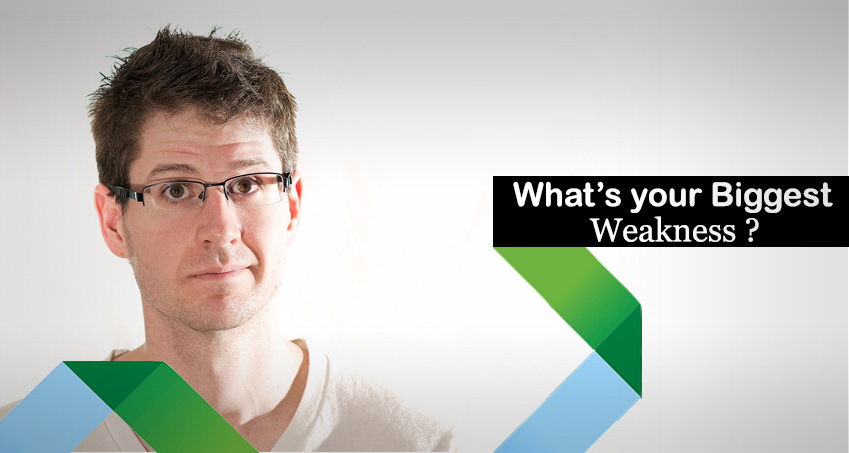Interview Question “What’s your Biggest Weakness?”. What to say and what not to

A job interview is one place where you desperately want to put your best foot forward, you want to be this perfect candidate for that job you have been dying to get, you are already on tenterhooks and then you are asked the dreaded question “ what’s your biggest weakness?”
First thing that flashes in your head, “they seriously want me to tell them what I am bad at” followed by a series of answers you contemplate, should I tell the truth, should I make something up, and you have to decide upon your answer in a few nanosecond, if not faster because you are getting the stare down from the panel of interviewers sitting in front of you.
So the next time if you don’t want to be caught in a desperate situation like this, a little prior preparation is a good idea. Googling for a correct answer is the common thing, we all do it, but giving a pre-prepared answer can come across as staged and that’s negative for you. Let’s discuss this a little more in detail, shall we?
Why does the interviewer ask about your weakness?
The purpose of an interview is not just to know your credentials; it is also to gauge you as an individual. Though your past has little relevance in the here and now, what really is important for the hiring manager at that time is to predict your future behaviour based on your answers.
We all have the weakness, that being established and accepted by all, the question that comes to our mind next is, why bother asking about them in a job interview? This question is a way of unnerving the interviewee; they want to know if you have a serious character flaw that you might reveal unknowingly during the interview session. One lie detected or sensed by the interviewer and your chances of getting the job will surely be going out of the window.
Various Answers to ‘The Question’
When asked this question, the responses usually fall under the following three categories, the ‘I have no flaws at all’ response or trying to make a negative sound positive ‘I am too ambitious for my own good’ response or the brutally honest answer ‘I have poor presentation skills’.
Though the last one seems like you the worst choice out of the three, but, on the contrary, honesty is the best path to tread on. Calling yourself a perfectionist might come across to the interviewers as you being plain simple delusional and tad bit obnoxious. No one is looking for perfectionists in an interview, other than the fact that it can be next to impossible finding a flawless human being, no one really wants to work with one, you see, the lesser humans might find it rather annoying. Coming to the second response, where the interviewee is trying to camouflage strength as a weakness. This won’t work either, as the interviewer can see right through the farce.
A Good Answer would be
An honest answer will fall under a good answer. An honest answer that shows you as a self-aware and in-touch-with-reality individual is the best bet.
Having a weakness is not the issue, living in denial or worse lying about it is. An honest answer is any day preferred over a practised cliché response. An honest answer makes you sounds genuine and thoughtful as compared to a robotic one. The rehearsed, googled response can be easily detected by the person interviewing you; chances have they have probably heard it a few times already. Another problem with these responses is that when the interviewer digs deeper, you might not be able to keep up with the lying.
In this quest of coming up with a genuine weakness during an interview, is to tell the one you actually have and then follow it up with ways you tried to overcome this weakness. Having the insight and maturity to acknowledge a flaw and then teaming it up with ways to tackle these weaknesses shows you as a person who can be an asset to their team.
“I realised in my previous job that I have poor presentation skills but to improve myself I enrolled for public speaking and soft skill trainings, which have helped me get over my fear of speaking in front of a group, it needed effort but it was worth it and I am happy with the improvement I have seen in myself”
What not to Mention
Even when you are being honest, there are a few deal breakers.
Telling a future employer that you lack a key skill that has been mentioned as a prerequisite in the job description is definitely not going to go down well with the hiring manager.
When asked about a weakness, your personality traits are being questioned as well, mentioning about having a bad temper, for example, might not settle well with the interviewer as well. They do not want to hire a troublemaker and an emotionally unstable person.
Avoid mentioning things related to personal life, the interviewer is not interested in knowing that, all they want to know is how well you will handle your work and the pressures related to the work, in case you are hired. It is preferred if you segregate the personal from the professional.

